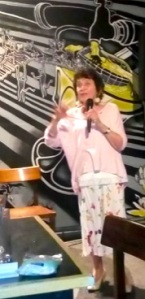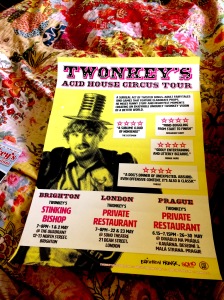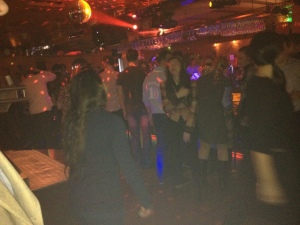
Alexander Frackleton at Heathrow Terminal 3 last Friday
On Friday, I had a chat with Alexander Frackleton, while he was transiting Heathrow Airport, London, on his way from Prague to Glasgow.
He is a Scot who has been living in the Czech Republic for a while, teaching English to business people.
He hasn’t been back to the UK for seven years and thought he might notice a few changes in Glasgow. I was interested to know how Prague was faring, as I worked there on a few short contracts in the 1990s. It was in Prague that I developed a taste for McDonald’s ice cream.
When I first went there, I had feared The Czech Republic in the mid-1990s might be a bit like the Soviet Union in the 1980s. Dull and dour and dreary and still partly living in 1917.
I was wrong. Prague was lively, entrepreneurial, awash with breweries, happy to be free of the Soviet Union and felt a bit like the Wild West. One night a romantic couple walked past me, his arm round her shoulder and something bouncing on his right hip. It was a handgun in a holster. He was a security guard of some sort.
Less worryingly, the Czechs also liked linking workmates’ birthdays to saints’ days. Every day seemed to be some saint’s day, so they could celebrate every day… I learned not think of them as Czechs but as Bohemians.
“What is happening in Prague?” I asked Alexander. “During Covid, did the Czech Republic have a tight lockdown like we did in Britain?”
ALEXANDER: At night, you were only allowed to go out between 9.00pm and 5.00am to journey to work or to urgently protect life, health and property – or if you were walking your dog. You were allowed to walk your dog within 500 meters of your house. One guy in České Budějovice in South Bohemia got busted by the police because he took a soft toy dog for a walk. When they stopped him, he tried to bluff it out, then claimed it was ‘performance art’. There was no-one else around.

A man out walking his stuffed toy dog was stopped by police… (picture via Czech TV)
JOHN: Ah! The creative mindset of the Czechs! When I was there, Prague and Dublin were the two weekend party capitals of Europe. Lots of drinking in both.
ALEXANDER: Well, in Prague, at the moment, they are trying to ban party costumes. It was proposed two weeks ago.
JOHN: Eh???
ALEXANDER: The locals were getting annoyed with drunken British stag and hen party people dressed up in outlandish costumes.

Gencraft AI’s not unrealistic image of tourists in Prague…
JOHN: What about clowns? Can’t clowns walk the streets in costumes?
ALEXANDER: I don’t think so. And it’s not something clowns tend to do in everyday life. The idea is they won’t let anybody – particularly British tourists – dress up in party costumes.
JOHN; Indoors?
ALEXANDER: You can probably do it safely indoors… but not outdoors. There’s quite a lot of it about. I was in Prague Airport today and there was a man dressed up as Barbie. I don’t know what happened when he went into town dressed like that. But the law isn’t passed yet.
JOHN: I wonder what the proposed penalty for dressing up as Barbie would be? It might be some draconian penalty – like being forced to watch Oppenheimer. Have you seen the Barbie film?
ALEXANDER: I went to see Barbie and didn’t know what the point of it was.
JOHN: It’s a feminist tract. I saw it with a 13-year girl. She loved it as an attack on the patriarchy. Did you see Oppenheimer?
ALEXANDER: I went to see Oppenheimer and fell asleep. My friend woke me up – twice – and then she gave up. The seats in CineStar Cinema are super comfortable. I did wake up with an almighty fright when they dropped The Bomb. A guy sitting next to me looked at me oddly and I said: “Very sorry; very sorry”.
When I got home, I looked up the proposed ‘silly costume’ ban.

Councillor Bronislava Sitár Baboráková, of the Prague 1 District, was quoted as saying the costumes she wants banned “exceed generally acceptable social conventions and negatively impact residents – particularly elderly people and children.”
She was also quoted last week as emphasising “the inappropriateness of the attire, especially full-body inflatable costumes” and explained that the suggested ‘silly costume’ ban intends to address not just “unruly tourist behaviour” but also “noise pollution.”
Prague resident Štěpán Kuchta told Czech media outlet Novinky.cz that he has taken it into his own hands to protest excess noise pollution in the city centre by going on a 10-day hunger strike.
“My health is already ruined by chronic noise,” he was quoted as saying. He also spoke about the “genocide of ordinary resident life in the center of Prague” and the “extermination” of local residents.
Personally, I am more distracted and unsettled by the image of British tourists in Prague wearing “full-body inflatable costumes”.
All that tsunami of Czech news swamped me last Friday afternoon.
On Saturday morning, I met my cousin Muriel, who was completing her 78 mile walk round London’s Capital Ring.
She has been doing it in stages. She didn’t walk 78 miles on Saturday. I only managed around four and a half miles before wimping out. I think she managed about fifteen miles to complete the Ring.
Muriel told me:
“Reg Presley of The Troggs was our brickie, He built a wall for us, but the people who moved in later knocked it down.”
“They should have kept it,” I suggested. “put a blue plaque on it and started a tourist business. Did Reg keep talking to you about UFOs?”
“No,” she said, “but he bonded with a woman who moved in later and they used to fly off to see crop circles together.”
Reg was renowned in his later years for his fascination with crop circles.





















